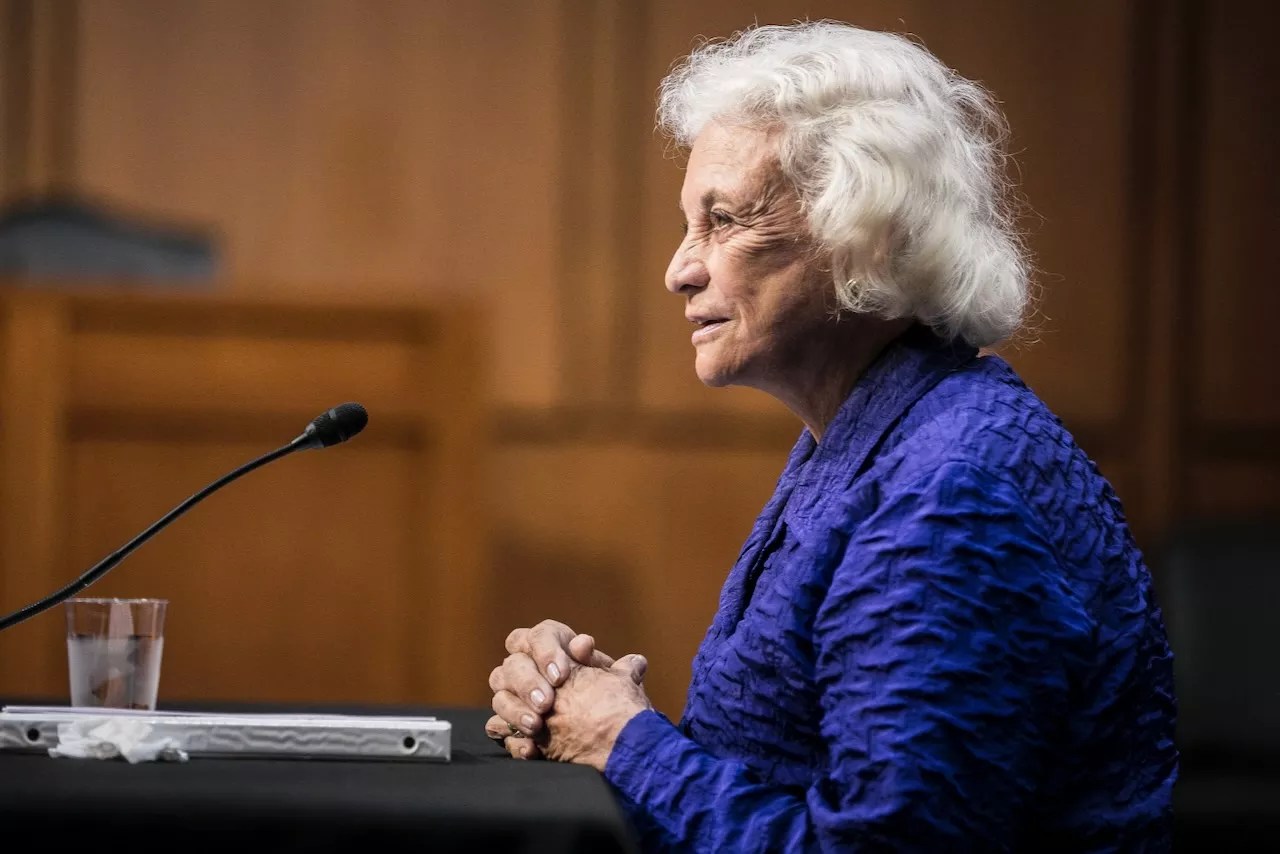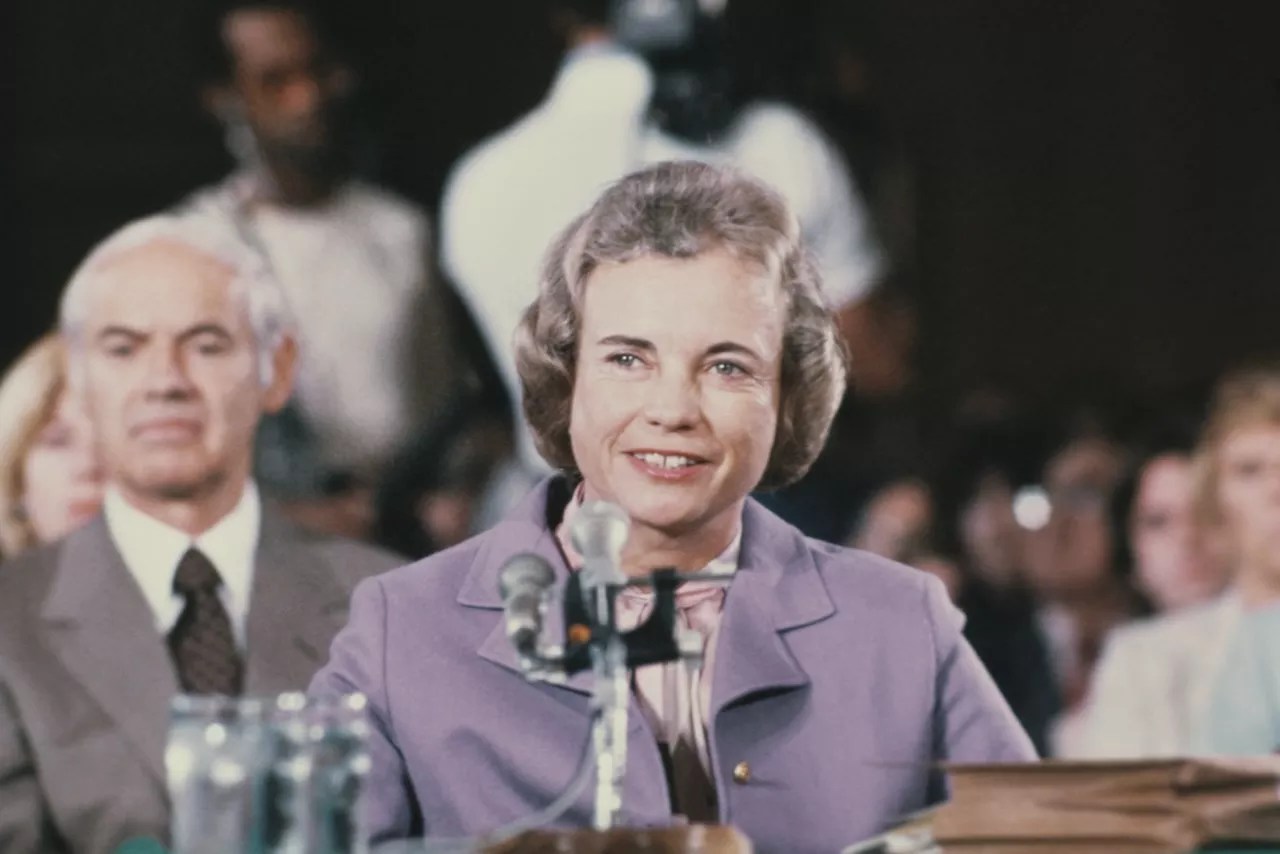
T.J. Kirkpatrick / Getty

Audio By Carbonatix
Sandra Day O’Connor – the first woman on the U.S. Supreme Court and a trailblazing Arizona jurist and state lawmaker – died on Friday in Phoenix, the court announced.
O’Connor, 93, died of complications related to advanced dementia and a respiratory illness, according to the high court.
“A daughter of the American Southwest, Sandra Day O’Connor blazed an historic trail as our Nation’s first female Justice,” Chief Justice John G. Roberts Jr. said in a prepared statement.
“She met that challenge with undaunted determination, indisputable ability, and engaging candor. We at the Supreme Court mourn the loss of a beloved colleague, a fiercely independent defender of the rule of law, and an eloquent advocate for civics education. And we celebrate her enduring legacy as a true public servant and patriot,” Roberts added.
O’Connor landed in Arizona in 1958, where she practiced law in Maryvale for two years. She served as assistant attorney general of Arizona from 1965 to 1969 before being appointed to the state Senate in 1969. She was later elected twice and became the state’s first female majority leader in 1973.
Two years later, in 1975, O’Connor was elected as a judge on the Maricopa County Superior Court after being appointed to the seat in 1974. She served until 1979, when she was appointed to the Arizona Court of Appeals.
Former President Ronald Reagan appointed O’Connor to the U.S. Supreme Court on Aug. 19, 1981. After serving more than 24 years on the court, she retired in 2006. Later that year, ASU College of Law was renamed the Sandra Day O’Connor College of Law at Arizona State University.
O’Connor was born in El Paso, Texas, on March 26, 1930. She received a bachelor’s degree in economics in 1950 and a law degree in 1952, both from Stanford University. Shortly afterward, she married John Jay O’Connor III in 1952. From 1952 to 1953, she served as deputy county attorney of San Mateo County, California, and then as a civilian attorney for Quartermaster Market Center in Frankfurt, Germany, from 1954 to 1957.
O’Connor wrote five books: “Lazy B: Growing Up on a Cattle Ranch in the American Southwest” in 2002, “The Majesty of the Law: Reflections of a Supreme Court Justice” in 2003, “Chico” in 2005, “Finding Susie” in 2009 and “Out of Order: Stories from the History of the Supreme Court” in 2013.
After she retired from the Supreme Court, O’Connor founded and led the education platform iCivics, according to the court.
O’Connor is survived by her three sons, Scott O’Connor, Brian O’Connor and Jay O’Connor; six grandchildren, Courtney, Adam, Keely, Weston, Dylan and Luke; and her beloved brother and co-author, Alan Day Sr. Her husband, John O’Connor, preceded her in death in 2009.
The court said funeral plans were not yet available.

Sandra Day O’Connor, at the time a judge on the Arizona Court of Appeals, testified at her U.S. Supreme Court confirmation hearing before the Senate Judiciary Committee in September 1981.
Keystone / Hulton Archive / Getty
Elected officials offer tributes to Sandra Day O’Connor
After her death was announced on Friday, current and former elected officials from across Arizona offered condolences. The state’s delegation in the U.S. House took part in a moment of silence on the House floor.
This morning, I led Arizona's Congressional delegation in a moment of silence honoring Justice Sandra Day O’Connor.@RepDLesko @RepRaulGrijalva @RepRubenGallego @RepDavid @RepAndyBiggsAZ @RepGosar @RepCiscomani @RepEliCrane pic.twitter.com/4fb6Ku0nkj
— Rep. Greg Stanton (@RepGregStanton) December 1, 2023
An iconic daughter of Arizona, Sandra Day O’Connor blazed trails for women everywhere as our nation’s first female Supreme Court Justice.
My full statement on her passing: pic.twitter.com/ZufzoAV4Md
— Rep. David Schweikert (@RepDavid) December 1, 2023
My statement on the passing of an Arizona icon, Justice Sandra Day O'Connor: pic.twitter.com/Hi9ByTGrKV
— Rep. Greg Stanton (@RepGregStanton) December 1, 2023
Justice Sandra Day O'Connor was a constitutional conservative and trailblazer who made lasting impacts on our country.
May we honor her dedication to public service at the SCOTUS, the Arizona state legislature, and Arizona state appellate courts.
She is gone but not forgotten. pic.twitter.com/gWRwzc4VFV
— Rep Andy Biggs (@RepAndyBiggsAZ) December 1, 2023
Sandra Day O’Connor was an Arizona trailblazer who dedicated decades to serving both our beautiful state and country.
The first woman to serve on the Supreme Court, Sandra broke barriers everywhere she went.
Sydney and I send our condolences to her family, friends, and the…
— Ruben Gallego (@RubenGallego) December 1, 2023
The loss of Associate Justice Sandra Day O’Connor is a hard hit for Arizona, our legal community and for me as a longtime admirer.
My deepest condolences to her family and friends.
[Official statement to come]— Adrian Fontes (@Adrian_Fontes) December 1, 2023
I am deeply saddened to hear of the passing of Justice Sandra Day O'Connor. She set a powerful example of leadership for so many to follow. 1/
— AZ Attorney General Kris Mayes (@AZAGMayes) December 1, 2023
Sandra Day O'Connor was the 1st female Senate Majority Leader in Arizona in 1973. I became the 2nd female Senate Majority Leader 44 years later.She was a trailblazer, worked across the aisle and believed in civil discourse. She was an inspiration to me and women around the world. pic.twitter.com/WE561xK8vG
— Kimberly Yee (@KimberlyYeeAZ) December 1, 2023
Recorder @stephen_richer: “Sandra Day O’Connor exemplified the best of Arizona and our entire county. As the first woman on the Supreme Court, Justice O’Connor broke barriers, championed integrity, and upheld the rule of law. Justice O’Connor was a steadfast leader in Arizona,… https://t.co/cU1Mffwuan
— Maricopa County Recorder's Office (@RecordersOffice) December 1, 2023
Today we lost an Arizona treasure and icon. Sandra Day O'Connor was America's 1st female US Supreme Court Justice. From Arizona’s Lazy B Ranch all the way to the Supreme Court, she knew everyone could make a difference. RIP my friend. pic.twitter.com/QvnzWvASN5
— Jan Brewer (@GovBrewer) December 1, 2023
Farewell to trail-blazing Arizona legend Sandra Day O’Connor, the first female Supreme Court justice, who has passed away at 93. Her unwavering commitment to the law and civics education will continue to reverberate. Our deepest condolences to her family. https://t.co/C1doBOFBV5
— Arizona House Democrats (@AZHouseDems) December 1, 2023
Sandra Day O’Connor was a trailblazing inspiration for women, especially those of us in Arizona. With her unique grit, O’Connor took any ‘no’ she got and turned it into a ‘watch me!’ – leading her all the way to the Supreme Court.
Her legacy is forever etched in our memories. https://t.co/VgjkPqS9IM
— Mayor Kate Gallego (@MayorGallego) December 1, 2023
Justice Sandra Day O’Connor put people above all else and created an eternal legacy that will forever be ingrained in the fibers of our state and nation’s history.
On behalf of the State of Arizona, I send my deepest sympathies to her family, loved ones & everyone touched by her…
— Governor Katie Hobbs (@GovernorHobbs) December 1, 2023